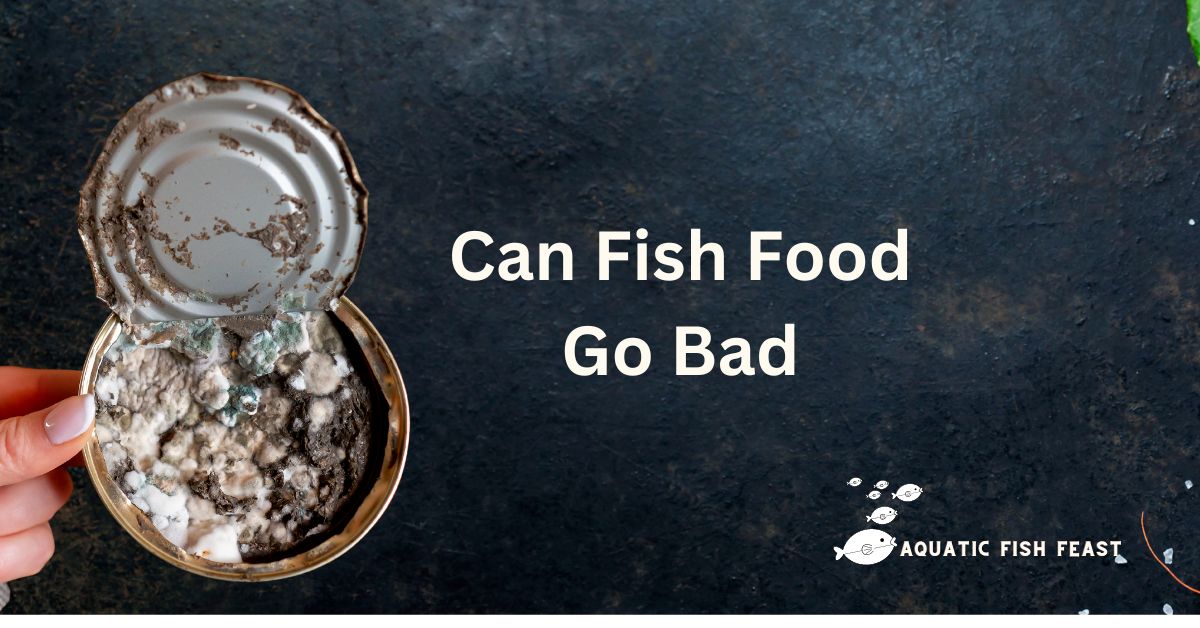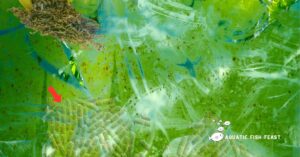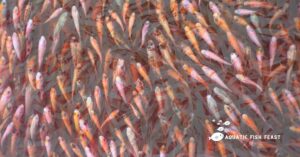Fish can go bad for many reasons. That may have answered the question: Can fish food go bad? But as you read further in this article, I will tell you all about it.
Fish food, in my experience, can spoil. I’m always curious if fish food expires.
As you may be aware, the expiration date of fish feeds is something that many people overlook, yet it is critical to keep your fish healthy.
As a result, you should pay close attention to the expiry date of fish feed.
When fish food expires, you must choose what to deal with and whether it may be used to feed your fish.
Does Fish Food Go Bad?
The basic answer is that fish food expires like other semi-perishable things.
Most fish food packets include both a batch number and an expiration date.
However, some pet owners need help determining the expiration date of their fish supplies.
Some fish food products do not specify an expiration date, but that’s not all; continue reading as I investigate the possibility of fish food spoiling, how to avoid and preserve it, and much more.
Now, let’s get started.
Read Also: What Can Fish Eat Besides Fish Food.
Table of Contents
Can Fish Food Go Bad
Again, does fish food expire? Yes, fish food expires, and all varieties deteriorate and expire.
Although feeding outdated food to your fish for an extended period may create health issues, it is unlikely to harm them.
Buy little fish food, store it in small pieces, and keep it in ideal conditions to ensure it lasts longer.
If your fish food is beyond its expiration date, it was most likely made two or three years ago.
You’ve also likely opened the packaging several times to feed your fish. It’s safe to presume that most of the vitamins, minerals, and nutrients have gone by then.
Depending on the preparation technique, nutrients such as vitamin C are likely depleted even before the container is opened.
Furthermore, a small amount of moisture enters whenever you open the container. This moisture accumulates over time and might cause difficulties if the food is stored for an extended period.
If you store the fish food properly, you may be able to serve the outdated food to your fish for several months after it has expired.
The type of food determines it. You should know your fish will not receive the nutrients they require to keep healthy.
Is Old Fish Food Dangerous To My Fish
Fish food that has expired poses a risk of poisoning your fish if it goes bad or gets infested.
While this is less likely to occur with dry goods, once frozen items have been thawed, they can start to deteriorate in a relatively short amount of time.
However, the food that sinks to the bottom of the tank untouched is a much more likely source of the toxin that kills your fish.
Suppose fish food is left in the tank for an extended period without being consumed by the fish.
In that case, it will soon decompose, contaminating the water with harmful levels of ammonia.
Because aquarium fish are more susceptible to death from poisoning caused by overfeeding than from poisoning caused by foods that have gone bad, you should never give your fish more food than they can swallow in minutes.
Read Also: Can Fish Food Cause Cloudy Water?
How To Keep Fish Food Fresh For Longer Periods
The freshness of pellet-based meals may be helped to be maintained by using airtight containers that can be screwed on firmly or fitted on snugly, zip lock bags, and the storage of the food in cold, dark areas that are free of moisture.
An intelligent action plan also includes making a mental note to ensure the container’s lid is securely fastened after every feeding.
Zip-lock bags are the most effective way to store frozen meals like bloodworm cubes and other items.
It is best to do so when feeding frozen items on or before the expiration date or shortly afterward.
In the case of foods prepared at home, a good rule of thumb to follow is to consume the food within two weeks of its preparation, presuming that it has been frozen rather than just chilled.
Can Silica Packets Ensure Fish Food Stays Fresh For Longer Periods
Before sealing the food packets and shipping them out to customers, most fish food producers include one silica packet in each meal packet.
This is done to guarantee that the food has a longer shelf life and does not become rotten before it expires.
If the silica packets are still sealed and unbroken, the answer is yes; you may use these to keep the fish food from being overly saturated with moisture.
You may also purchase silica gel packets on your own, enabling you to keep the fish food you buy in bulk fresh for a significantly longer time.
Adding one to two extra silica packets for every two pounds of fish food should do the trick.
It is important to remember that silica packets can only be used to store meals of the pellet variety, not frozen foods, bloodworms, or other meaty delicacies.
Extracts of garlic can be added to frozen dinners to extend the shelf life of handmade frozen dishes that have been frozen.
How Can You Tell That Fish Food Is Bad
The good news is that expired feed exhibits various symptoms you may detect before it wreaks havoc on your fish’s health.
How can you tell if fish food has gone bad?
Here are several indicators:
1. It begins to lose color:
Every commercially available high-quality fish feed has a distinct color. The color of the food reflects how fresh it is, and it should seem appealing to fish.
As a result, people should be tempted to consume it. However, after the deadline has passed, the color begins to fade.
When the food becomes faded and strange-looking, it is time to stop feeding it to your fish.
Food retains its nutritious value when it is in its natural color.
When it fades, the food’s advantages begin to diminish swiftly. So keep an eye on the expiry date because the food may be partially rotten, but it does not remain the same.
2. It Demonstrates Mold Growth:
When the package is unsealed, fungi enter it with the moisture in the air, resulting in mold formation. Your fish may become ill if they take this molded meal.
The infiltration of germs and fungus into packaging is primarily caused by human error, causing the food to get moist and lose nutritional value.
After the due date, the fish-feeding items may become more exposed to the water.
As a result, if you see the food becoming clumpy and soggy, check the expiry date on the box and replace it with fresh stock.
3. It Tastes Horrible:
We may detect how our packaged food changes taste after expiration based on our experiences. The same is true for fish food.
Like any other animal, fish is conscious of its food’s flavor and consumes it with passion.
And if the meal is past its expiration date, their taste buds will reject it.
This is the most popular method of determining whether or not the food has expired.
Is Expired Food Harmful To Fish
Even if it doesn’t kill the fish, you shouldn’t do it since it’s not good for their body and won’t hurt them in any way.
After using expired food, the very small items show no signs of sickness or allergic reaction.
They do not put on weight even when they consume food that has gone bad for an extended time.
People need to start avoiding it for various reasons before it is a diet that does not affect them.
Fish feeding has a direct and significant effect, for the better, on the health of the fish.
After consuming these ready-made products, they experience a weight increase.
It is a concern when you discover that the feed does not affect the weight of your fish in any way.
Using fish feed over its expiration date does not cause the little creature any damage, but it does not provide any advantage.
They begin to experience a decline in their health, which, if left unchecked, can ultimately result in the fish’s demise.
Final Thought
Now that we have answered the question, “Can fish food go bad?” It is clear that fish food can go bad, so you must keep your fish healthy as a fish lover and keeper.
Fish provide color to your life and are a terrific buddy or partner.
As a result, you should take great care of your companion. Correct feeding is one of the most important aspects of keeping your fish healthy.
When feeding your fish, you need to consider many vital variables. You should choose appropriate foods based on your nutrient requirements.
Other Helpful Articles:




